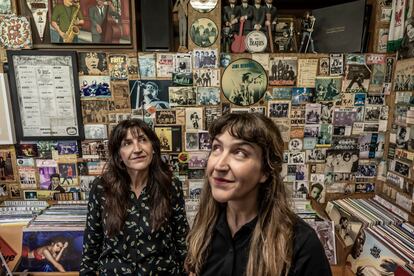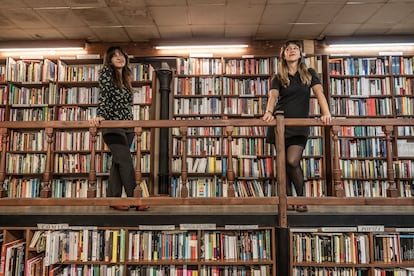If all bookstores are full of books, the Paradiso bookstore, in Gijón, with its floor-to-ceiling shelves and that hallway on a second height, seems more full of books than any other. Various volumes are piled up on the novelty tables, each one different, so that the visitor has to dismantle each pile to review one by one. No less important are the vinyls, in the nook of the entrance, where David Bowie, Bob Dylan or La Banda Trapera del Río look at you from posters, surrounded by a large collection of concert tickets. Wood, music, paper. Right now it sounds Out of the questionby Californian garage makers The Seeds.
The bookstore, founded by José Luis Álvarez at the end of the seventies, has accompanied the countercultural currents of each era, from post-Franco progressivism to the Xixón Sound, which filled with music indie and artistic concerns in the nineties in the northern city. Two prominent figures of that movement are Alicia and Mar Álvarez, 45 and 50 years old, respectively, daughters of the founder, who appear at the door shaking their umbrellas. They grew up in this scenario. “We spent a lot of time here, playing with the old cash register, turning the crank, going down the railing or reading Mafalda comics on the couch, waiting for our father,” says Alicia. There were large ashtrays on the editorial news, because back then people still smoked indoors, and the smoke slowly dispersed throughout the book space.
Alicia and Mar grew up, therefore, surrounded by culture: in their room they had their own bookcase and their own record player. “We grew up intensely together,” says Mar. When her little sister was born she thought: “What now?”; but when Alicia started to speak it became: “How cool, I already have a colleague!” They have been well involved in numerous projects all their lives, so much so that the natural coordination with which one takes the floor and the other continues the story at the precise point where the first leaves off is astonishing.
“Our contagion with culture was environmental,” continues Mar, “at home there was a piano, guitars… We had no pressure to read or watch movies, but it was inevitable to do so.” In the nineties they stood out as part of the successful female group Undershakers (Mar was 19 years old; Alicia, 14), and when it faded away they put together the project that reaches the present day: Pauline on the Beach, a name taken from the famous film by Eric Rohmer . It was one of those VHS movies that were in the family house; and the Frenchman’s customs fit well with the spirit of the band. Vocal harmonies, melancholy, poetic lyrics, great care for the melody. Delicacy. They are your coordinates. With his new and eighth album, The long dayspublished this Friday, turns 25 years old. “The most beautiful thing is the people who follow you historically, those who accompany you on the journey,” says Mar.
Over time they have learned not to be in a hurry and take maximum care of their music. “We only release an album when we have enough songs, and they are beautiful. We don’t add filler songs,” they say as a duet. The first single from his new work, I could be John Waynehas a border western feel, but not the rest. “We have not turned country suddenly, like Beyoncé,” they joke. Theirs is an intimate, signature pop that tends towards dreaminess and nostalgia. In the beginning they were compared to Hemstitch Double. If in other works they used string and wind arrangements, here the synthesizers take a certain role. All orchestrated together with producer Luca Petricca, and culminated with the house’s trademark poetry.
Where did Xixón Sound come from? The Paulines say that the city had a strong musical tradition, but that in the nineties new airs arrived from outside that moved away from traditional Spanish pop. “It was the social context of industrial reconversion, a generation that, like everyone else, reacts to the above, and an independent positioning. Those kids were interested in doing things for ourselves,” says Alicia, already on the beach of San Lorenzo, from where you can see, perched on the hill, the Praise of the horizonChillida and, downhill, the fishing neighborhood of Cimadevilla, where a good part of the movement took place. They don’t live very far, near the port, the two behind windows that look at the waves. From that youthful ferment came bands like Australian Blonde, Manta Ray, Doctor Explosión, Nosoträsh, Penelope Trip, etc., or, in a second wave, the singer-songwriter Nacho Vegas. Although the bands were musically heterogeneous, the audience was common, and did not dislike one style or another. There was a scene. It came out in The Land of Temptations.
‘indie’ review
Subsequently, there has been a review of the indie nineties in general, which has been criticized, in addition to the frequent use of English, the lack of political commitment in times distant from the outbreak, in 2008, of this sustained crisis. “I don’t agree with that at all,” says Alicia, “here there were concerts in support of the Naval Gijón workers or for insubordination. The bars indieslike El Guetu, where we all stopped, were full of calls for demonstrations, and many of us are still involved in many issues. “I don’t believe that stereotype of young hedonists who only looked at their navel.”
Independence itself, they think, was already a political position and the relationship between music and politics does not even have to be explicit, as in singer-songwriters or radical rock, to exist. By the way, guitar music does not have to be finished these days with a youth dedicated to urban music: “Look at the success of Catriel and Paco Amoroso’s Tiny Desk concert: it’s pure funk! And people are crazy, because they miss music made with instruments,” says Mar.
He indie from now on, already so mainstream and festival goer? “If anyone could have heard it in 1994, they wouldn’t have said it was indiewith those means of production. Then everything was more homemade, with fewer technical possibilities,” says Mar. “The way Belle and Sebastian sounded, more washed out, but warmer,” says Alicia, already in front of a soft drink and some teas in a cafe on the so-called Ruta de Los Vinos Gijón, where soul sounds at midday.

The Paulines, although they have maintained their project over the years, have known how to combine it with many other initiatives. Mar, for example, with the successful family music band Petit Pop, which tries to move away from the traditional sounds of childhood and which also has a music school, called Sonidópolis, in Gijón. Alicia has also recorded an album for children, Cricket. “If you sing about what happens to you, it is normal that when you are a mother you also dedicate yourself to making that music,” says Mar. “In addition, we incorporate the family in these projects,” adds Alicia. Children, in fact, go to the concerts or help put up the posters.
Alicia also founded La Fabriquina, a publishing house with a special focus on children’s books, which has launched into books for adults with never defeateda successful essay by David Guardado, which analyzes the historical idea of Asturias. For 17 years he hosted the morning show on Cadena Ser in Gijón, in that famous studio that overlooks the sea. And both present a program about music on regional television: Sonadia. “Everything that has occurred to us, we have been doing… although we have never had a predefined plan to do things,” says Mar.
How is it to have a birthday when you have lived such a cool youth? “Well, in reality we continue living the same. If we had had a group when we were young and now we felt nostalgic…” says Alicia. “But we continue loading the van, doing concerts. Sometimes, we are carrying the amp between us and we look at each other and we are like: so many years and we are still doing this,” concludes Mar.

